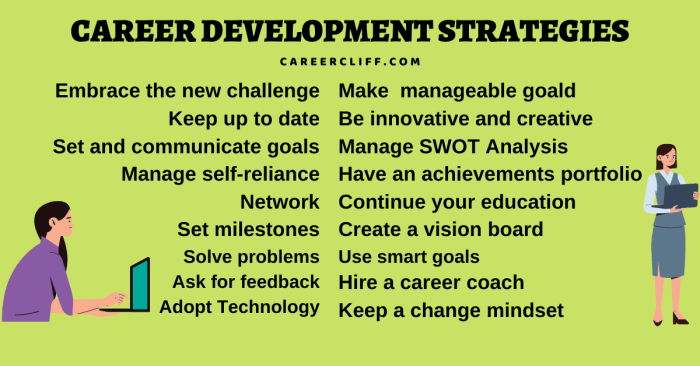Career Growth Strategies are essential for professional advancement and personal fulfillment. From identifying the right strategies to implementing them effectively, this discussion explores the key elements needed to navigate the journey of career growth successfully.
Importance of Career Growth Strategies
Having a well-defined career growth strategy is essential for professional development. It provides a clear roadmap for individuals to progress in their careers, set achievable goals, and continuously improve their skills and knowledge.
Impact on Job Satisfaction
Career growth strategies play a significant role in job satisfaction. When individuals have a clear path for advancement and see their efforts translating into tangible results, they are more likely to feel motivated and satisfied in their roles.
Impact on Overall Success
Successful individuals and companies have effectively utilized career growth strategies to achieve their goals. For example, companies like Google and Apple are known for promoting a culture of continuous learning and growth, which has contributed to their success in the industry.
Types of Career Growth Strategies
When it comes to advancing in your career, there are various strategies that individuals can implement to achieve their professional goals. Some of the key types of career growth strategies include skill development, networking, further education, and goal setting.
Skill Development
One important career growth strategy is skill development. This involves continuously improving and expanding your skill set to stay competitive in the job market. By acquiring new skills or enhancing existing ones, individuals can increase their value to employers and open up new opportunities for career advancement.
Networking
Networking is another crucial strategy for career growth. Building and maintaining professional relationships can lead to new job opportunities, mentorship, and valuable connections in your industry. Networking allows individuals to learn from others, gain insights into different career paths, and stay informed about industry trends.
Further Education
Pursuing further education, whether through formal degree programs, certifications, or workshops, is a key strategy for career growth. Continuing education can help individuals stay current in their field, acquire specialized knowledge, and enhance their qualifications for higher-level positions.
Goal Setting
Setting clear and achievable career goals is essential for career growth. By establishing short-term and long-term goals, individuals can create a roadmap for their professional development and track their progress over time. Goal setting provides direction, motivation, and a sense of purpose in one’s career journey.
Implementing Career Growth Strategies

Implementing career growth strategies is crucial for achieving your professional goals. Here is a step-by-step guide on how to create a personalized career growth strategy:
Creating a Personalized Career Growth Strategy, Career Growth Strategies
To create a personalized career growth strategy, start by assessing your current skills, strengths, and weaknesses. Identify your short-term and long-term career goals. Research the skills and experience needed to reach those goals. Develop a plan that Artikels actionable steps to acquire the necessary skills and experience.
Regularly Reviewing and Adjusting Strategies
It is important to regularly review and adjust your career growth strategies based on changing circumstances or goals. Set aside time every few months to evaluate your progress. Identify areas where you may need to make adjustments or set new goals. Be flexible and willing to adapt your strategy as needed.
Staying Motivated and Focused
To stay motivated and focused while implementing career growth strategies, break down your goals into smaller tasks. Celebrate small victories along the way to keep yourself motivated. Surround yourself with supportive peers or mentors who can provide encouragement and guidance. Stay organized and maintain a positive mindset throughout your career growth journey.
Overcoming Challenges in Career Growth

When it comes to pursuing career growth, individuals often face various obstacles that can hinder their progress. It’s important to identify these challenges and develop strategies to overcome them in order to reach your full potential.
Lack of Skills or Qualifications
One common challenge in career growth is the lack of necessary skills or qualifications for advancement. In this case, it’s essential to invest in continuous learning and development to acquire the skills needed for your desired career path. This could involve taking courses, attending workshops, or seeking mentorship from experts in your field.
Work-Life Balance
Another challenge that many individuals face is maintaining a healthy work-life balance while striving for career growth. It’s important to set boundaries, prioritize self-care, and communicate effectively with your employer to ensure that you are not sacrificing your personal life for professional success.
Imposter Syndrome
Imposter syndrome, or the feeling of being inadequate despite evidence of success, can be a significant barrier to career growth. To overcome this challenge, it’s crucial to acknowledge your accomplishments, seek validation from others, and work on building self-confidence through positive self-talk and affirmations.
Role of Mentorship and Support Systems
Mentorship and support systems play a crucial role in helping individuals navigate challenges related to career growth. A mentor can provide guidance, advice, and valuable insights based on their own experiences, while a strong support system of friends, family, or colleagues can offer encouragement and motivation during difficult times.
Real-Life Examples
One inspiring example of overcoming setbacks in career growth is Oprah Winfrey, who faced numerous challenges early in her career but persevered to become a successful media mogul and philanthropist. Another example is Steve Jobs, who was fired from his own company before returning to lead Apple to new heights of success.